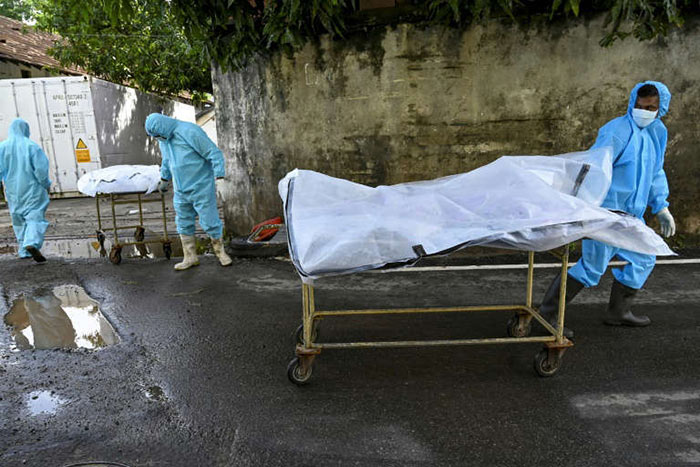Sri Lanka rejects lockdown to beat Covid ‘bomb’

Sri Lanka’s government rejected on Tuesday mounting calls for an immediate lockdown to contain a surge in COVID-19 cases and deaths that is severely stretching hospitals and crematoriums.
Government spokesman and Media Minister Keheliya Rambukwella said the country had not reached a critical stage even as the island nation suffers more than 100 deaths per day on average.
“Curfews or a lockdown is the last resort, but we are not there yet,” Rambukwella told reporters. “Our target is to get everyone over the age of 18 vaccinated by September and thereafter it is in the hands of the gods.”
His comments came despite the Sri Lanka Medical Association (SLMA) issuing what it called a “final warning” to the government to restrict the movement of people immediately or risk a bigger catastrophe.
“We have given the final warning to the government to take urgent steps to lock down at least for two weeks,” said a spokesman for the SLMA, a professional body of medical experts.
A junior minister for health, Channa Jayasumana, called the Delta variant of the virus “a powerful bomb which has exploded in Colombo and is spreading elsewhere”.
On Friday the government tightened some restrictions, banning state ceremonies and public gatherings until September 1.
But most activity is allowed, with shops, restaurants and offices open and public transport still operating.
The number of deaths hit a record 111 on Monday with the daily average in the past week crossing 100 — more than double the average of 40 in the previous week.
The number of infections also more than doubled to nearly 3,000 this week.
At one morgue in Colombo on Tuesday morning, workers tested 15 corpses for COVID-19 and then cremated them to clear the way for more bodies.
A Colombo magistrate ordered the immediate disposal of 40 corpses that remained unclaimed by the next of kin.
The Colombo Municipal Council began mass cremations Sunday to clear a backlog after hospital mortuaries ran out of refrigeration space for bodies.
Just over 11.2 million people out of the population of 21 million have been given at least one vaccine jab, while 3.2 million had received both as of Monday.
Sri Lanka has recorded 5,222 deaths to date and almost 333,000 infections, according to official data.
(Source: AFP – Photo By ISHARA S. KODIKARA)
Latest Headlines in Sri Lanka
- Sri Lankan President Anura Kumara Dissanayake meets Chinese President Xi Jinping January 15, 2025
- Trincomalee Oil Tank Farm to Boost Sri Lanka’s Economy January 15, 2025
- Sri Lanka President pays tribute at Mao Zedong mausoleum January 15, 2025
- Drug kingpin ‘Wele Suda’ and associates sentenced for money laundering January 15, 2025
- 12-hour water cut in Colombo tomorrow January 15, 2025



Good courageous decision. While the professional’s duty is to advice when needed and asked, it is government job to make the decision. Unlike the professionals and their organizations specialised in one thing only, government is responsible and should take the overall situation and how a decision made affect people and the overall situation in the country both in the present and future. It needs to ensure there is money to feed the population and healthcare, among other things in the days and months to come. Even in the developed countries including the US and UK there has been massive number of COVID related deaths regardless of five star health systems. In Sri Lanka too, nobody can stop aged and people with health issues dying from the disease regardless of how sad it will be, since it is the mother nature’s way to eliminates the less fit. Sri Lankan public can do much more to control and stop the disease soon if they follow the guidelines and understand wearing a mask is not going to completely protect them even if it is worn properly. I hardly see people in Sri Lanka keeping the necessary distance from each other. It is the job of the GMO, Political parties and other health allied bodies to concentrate of these and do what we can do without any cost to control COVID, instead of constant blame and vilification of the government. This morning I read a professor had said an island wide curfew will save 1200 COVID deaths. Sound good taking on its own. But has the good professor got a clue how the island wide curfew will affect the other aspects of life including food and fuel distribution and people’s income and country’s production? Professor at least need to look at his estimation in the context of number of healthy and young people dying on Sri lankan roads with accidents within a month. That is leaving aside the number of killing taking place within a month!